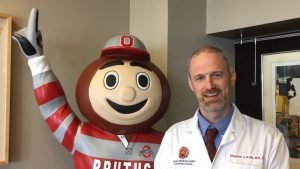Cure SMA Awards OSU’s Stephen J. Kolb $75,000 Grant to Study Motor Neuron Pathology in SMA Piglets

Cure SMA has awarded a $75,000 basic research grant to Dr. Stephen J. Kolb of Ohio State University (OSU) for a project that seeks a deeper understanding of motor neuron pathology in spinal muscular atrophy (SMA).
The project, “Arrested Development or Neurodegeneration? An approach to understand developmental motor neuron pathology in SMA,” includes creating a large animal model of newborn infants with SMA, then using this model to understand the changes seen in motor neurons.
Kolb and his team will create the model by delivering a virus in utero to fetal piglets that will eliminate the expression of SMN — the protein lacking in SMA. Once the piglets are born, the researchers will study the motor neurons and determine if their findings match those in infants with SMA.
The project will address the urgent question of timing to optimize delivery of SMN-increasing therapies like Spinraza in infants with SMA, and allow predictions about the long-term success of these therapies by modeling the consequences of low SMN during fetal development.
In other words, the aim is to find out when SMN-increasing therapies should be given to infants with SMA in order to provide the greatest possible benefit.
Kolb is a physician-scientist specializing in neurology and neuromuscular diseases, with a particular focus on diseases that affect the motor neuron. His team works to understand how motor neurons develop, are maintained and respond to injury — and why specific gene mutations result in degeneration.
Kolb first became involved with SMA research after completing his residency in neurology and becoming a postdoctoral fellow in the laboratory of Dr. Gideon Dreyfuss, who discovered the central biologic function of the SMN protein. It was in this lab that Kolb gained the full notion that motor neurons are selectively vulnerable to errors in how DNA is converted into RNA and proteins.
Kolb led the NeuroNEXT SMA Infant Biomarker Study (NCT01736553), which accelerated SMA drug development and led to crucial insights about the disease.
Cure SMA’s $75,000 grant is part of a $1.03 million basic research funding effort announced by the Chicago-based nonprofit organization. Its comprehensive research model seeks to fund research that investigates the biology and cause of SMA in order to identify the most effective strategies for drug discovery.








